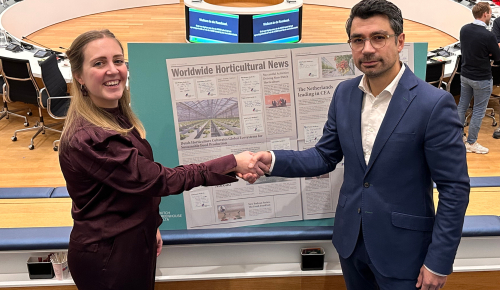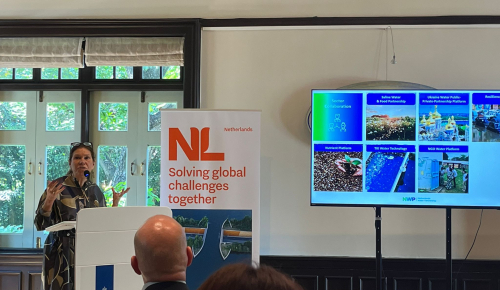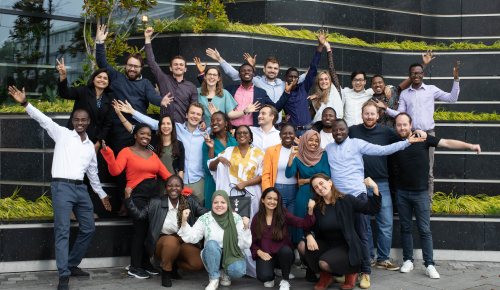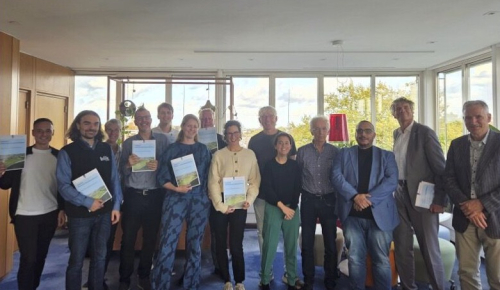Interview
8 December 2021Meet Adélaïde Umuhuza, DSS water expert in Nigeria
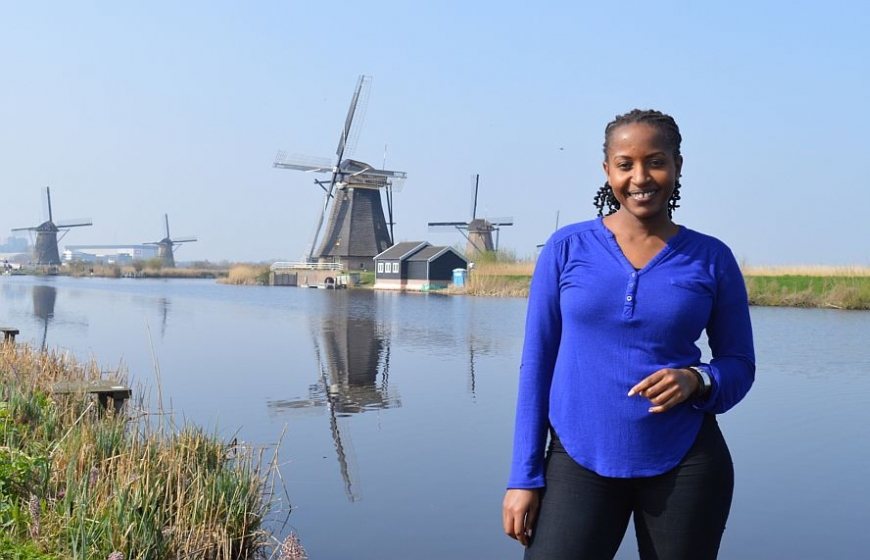
All over the world, large groups of refugees are fleeing. They all need a safe place to stay. Shelter, food and water are the first needs for survival. However, many camps face the danger of floods. With floods come the outbreak of water-borne diseases and sanitation problems. To prevent refugee camps from flooding, response experts come to the rescue.
Adélaïde Umuhuza is one of those experts. She joined the Dutch Surge Support (DSS water) initiative to help international humanitarian organisations with water-related disasters worldwide. Read Adélaïde's story on how she travelled from Rwanda to the Netherlands to a refugee camp in Nigeria.
"Well, for me, it was a logical step. From 2016 until 2018, I worked for two Dutch programmes on integrated water resource management in Rwanda. These programmes mainly dealt with water monitoring and catchment planning. Then something remarkable happened! I received an Orange Knowledge Programme scholarship for my Master's degree in Water Science and Engineering. My specialisation was Land and Water Development for Food Security at IHE Delft International Institute for Water Education. I could not have been more proud."
Where does your fascination for water come from?"Rwanda has many water resources, but the water quality is not good enough to benefit communities. Also, the government does not use the full potential of the available water resources. I was and still am fascinated by the combination of these two factors. This made me decide to do my Bachelor's degree in Water and Environmental Engineering.
After graduation, I worked as an Assistant Irrigation Engineer on a sprinkler project. This was in the east of Rwanda. When the project finished, I learnt about one of the two Dutch water programmes. I was lucky to be recruited as an intern for that programme. Little did I know at the time that this was the start of my career in water engineering. I discovered many opportunities, including the interesting link between water and humanitarian aid."
How did your work with DSS water come about?"My initial plan was to graduate and apply the Dutch water knowledge in my home country, Rwanda. But I graduated last year during the COVID pandemic. I could not get a flight home, so I had to stay in the Netherlands and wait. I kept looking for ways to make myself useful. I learnt about DSS at water events in 2019 and have loved DSS' role in the humanitarian sector ever since. When I saw their advertisement for experts, I did not hesitate for a second and applied. This is how my first DSS water assignment came about. It truly opened my horizons, as my first assignment was also my first time working in western Africa."
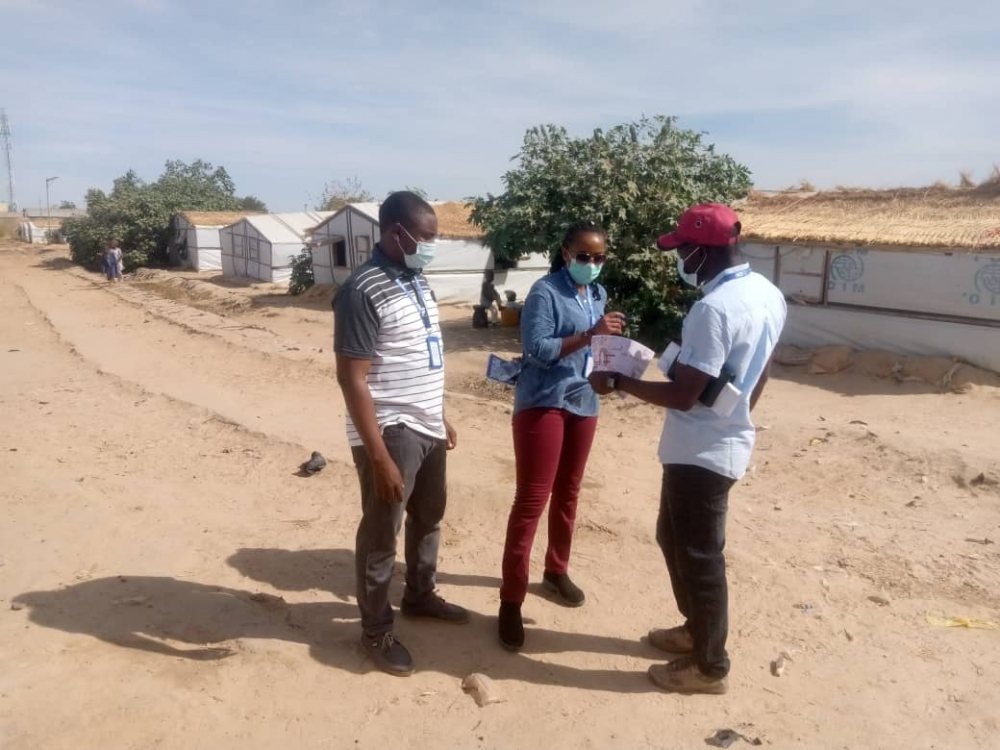
"The DSS water project I worked on involved support to the International Organization for Migration (IOM - UN Migration) in 25 of the 130 refugee camps. Can you imagine one region with 130 camps in the northeast of Nigeria? Most of the camps were affected by floods during the rainy season. You see, in the humanitarian sector, the focus is on water, sanitation and hygiene (WASH). But there is hardly any focus on other water aspects, such as flooding.
DSS got involved by supporting drainage management within the camps. My assignment was to identify the causes of the floods and propose measures from an expert point of view. Floods in camp settings are dangerous. The people in the camps have already been through so much. You do not want them to experience yet another disaster. They all deserve proper solutions, so who better to ask than a Dutch organisation. It made me feel proud to be a part of that project."
How has the assignment influenced you as a person?"I found the assignment valuable on different levels. It was my first opportunity to apply the knowledge of my Master's studies. I got introduced to the humanitarian sector. Also, it opened my eyes to the lives of internally displaced people. And I experienced working together with United Nations agencies.
I found that there is a lot to learn from the people affected by crises. When it comes to dealing with water-related problems, there is also a lot to share with them. My assignment in Nigeria was a unique experience, considering the COVID-19 limitations."
To advise on flooding issues during the rainy season, I needed complete hydrological data. This is where Deltares stepped in. We used models they had developed earlier and their support was crucial for the modelling part of the assignment.
Adélaïde Umuhuza
"One of my duties was to collect information, but I could only collect locally-available information. To advise on flooding issues during the rainy season, I needed complete hydrological data. For example, rainfall data in remote areas. This is where Deltares stepped in. They helped me with global dataset information. We used models they had developed earlier. Their support was crucial for the modelling part of the assignment. And I liked having people around me to work with. Their support boosted my confidence and spirits in an environment that sometimes made me sad."
Rwanda, the Netherlands, Nigeria. Where do you go from here?"I am already on my way again! I have started a PhD at UNU-MERIT in Maastricht, the Netherlands. By the end of my assignment in Nigeria, Deltares was starting a programme on water management, humanitarian aid and migration. There is a need to understand interventions better, link the engineering side with the social side, and make sure that the people actually benefit from interventions. So, in my PhD, I want to look at water security around internally-displaced people and refugee camps. I hope to gather the tools needed to make a lasting, positive impact on the difficult lives of the people in the camps."
More information
Sign up to be a DSS water expert
Are you an expert on emergency aid in water disasters? DSS water is always looking for new experts. Visit the DSS water website to learn more and sign up as an expert.
Deltares
Read more on the Deltares project Mitigating Floods in IDP Camps: Northern Nigeria and discover how they have worked with IOM - UN Migration, the Netherlands Enterprise Agency RVO, and the Netherlands Red Cross to improve flood mitigation measures.
